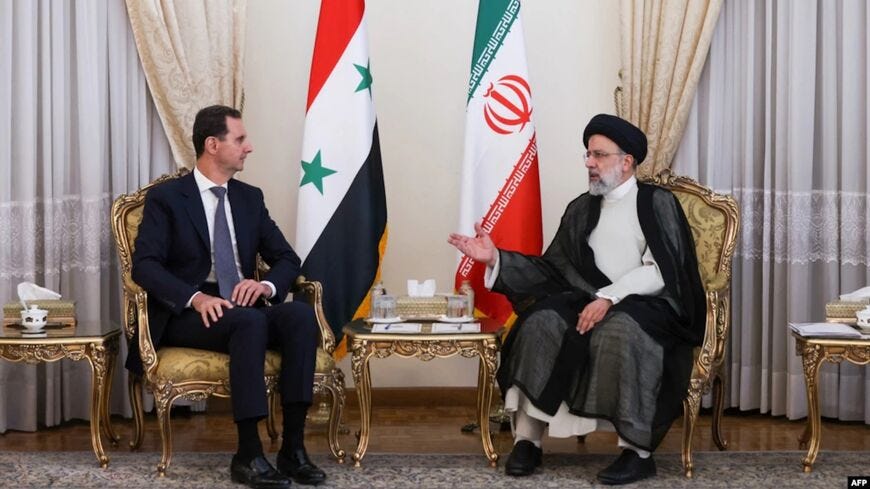Western Democracy vs. Pro-Russian Dictatorship 1:0... and it is only the beginning
The recent diplomatic whitewashing of Syria’s president, Bashar Al-Assad, sends a clear message that those who ally with Russia and its allies (Iran) will find protection and intervention.

Dear Dictators all over the world,
No matter how many crimes against humanity you commit at home, as long as you side with Russia, you are just fine. Russia will help you stay in power and will even ensure you are still accepted by the international community.
This is how current events in the Middle East read to me. The recent diplomatic whitewashing of Syria’s president, Bashar Al-Assad, sends a clear message that those who ally with Russia and its allies (in this case, Iran) will find protection and intervention. And this is not just a Middle Eastern issue. It presents a much larger problem, not only for the populations of African and Latin American countries, but also for Western democracy.
Who are these dictators Russia seeks to ally with? Totalitarian leaders of poor countries whose nondemocratic leadership struggles to keep power without military force and outside help. In return for alliance with Russia, Russia and its other allies will not only help keep those dictators in power using their own force (like the Wagner group), but will also later protect those dictators from any international restrictions incurred for relying on such help.
What proof does the existing pro-Russian alliance have for its ability to do this? They’ve just taken the hardest such case and succeeded. The top dictator in the world is still Assad, president of Syria, and he has now become the poster boy for pro-Russian ability.
Not only has Assad retained power after a decade of civil war, but, with the help of Iran and Russia, he is not even an outcast anymore (at least in the Middle East). In addition to recently being readmitted to the Arab League, Egypt’s foreign minister visited Damascus in February. In April, Saudi Arabia’s top diplomat also made a trip to the Syrian capital and met with Assad. Other indications of his acceptance include the United Arab Emirates not only hosting a recent visit from Assad but reopening their embassy in Damascus. In April, Saudi Arabia also announced they would reopen their embassies and resume flights, and flights to Damascus are needed because tourists, journalists, and politicians are now visiting Syria regularly, often on Russian-facilitated tours. One of the earlier movements toward reacceptance was Jordan reopening its border with Syria in 2021.
Russia is also currently working on normalizing relations between Syria and Turkey. Meetings on the ministry of defense level just happened in Moscow, and now Russia is hosting a meetings between Russian, Turkish, Iranian, and Syrian ministers of foreign affairs. This meeting will also takes place in Moscow.
To put it less diplomatically, the same Russia that invaded its neighbor Ukraine and is still shelling its towns, along with Iran—that still supports international terrorist organizations and provides the weapons Russia uses to kill Ukrainian civilians—have successfully reinstated Syria that has used chemical weapons on its own civilians and killed half a million people from the international community.
The new role of China in the Middle East is also emphasized. Earlier in May, Iran’s president, Ebrahim Raisi, visited Assad and they issued a joint statement saying that their China-brokered agreement in March to resume diplomatic relations between Iran and Saudi Arabia constituted a "significant step toward positive developments that are in the interest of the stability of the Middle East."
These developments are changing the power structure of the Middle East. Not only does this move it closer to Russia’s plans for the region, but it moves Russia one step closer to their publicized new world order. And they do not plan to stop with the Middle East. This summer, President Raisi plans to visit Africa and repeat the tour Russian Minister of Foreign Affairs Sergey Lavrov made earlier this year. Raisi plans will bring him to visit South Africa, a member of BRICS and an extremely influential country on the continent.
It is understandable that the US is now preoccupied with another part of the world, namely Europe, but so is Russia. And if the West does not take a harder stance against Russian diplomatic efforts in non-Western countries, there is a real danger of losing them to Russian influence. Strong words from the International Criminal Court about prosecuting Putin are not enough, something the US and Putin also learned from their dealings with Assad in Syria. Not only was Assad not arrested after what he did to his country, he was recently readmitted to Interpol, the same international organization originally founded to arrest such people.

